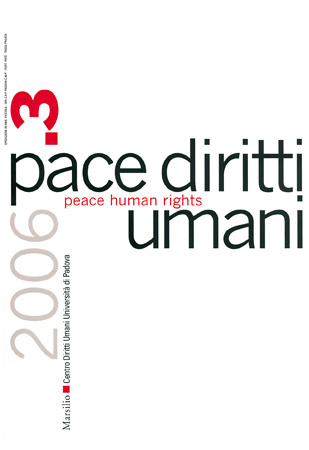Collections

L’Unione Europea nello scisma transatlantico
- Contained in
- Pace diritti umani - Peace Human Rights, 3/2006
- Pubblication type
- Articolo / Saggio
- Pages
- 103-117
- Language
- IT
The European Union in the Transatlantic Schism
Antonio Papisca
If we look at the increasing political, economic and legal tensions between the European Union and the United States of America we wonder whether the identity of the West still exists as such. The text of the (project of) «European Constitution» is revealing to this regard: no reference is made to «Western» values. A divarication process is affecting the historical transatlantic identity of the West, as it was developing from 16th century to mid 20th century. It was an identity made of positive and negative aspects. Positive aspects refer primarily to the legal recognition of fundamental rights. The West was still united during and right after WW II when, with the United Nations Charter and the Universal Declaration of Human Rights, it offered the best of itself to the world. This event marks the end of the West, it is its noble swan song. The USA and Western Europe shared the same vision of a world order based on the principle of the respect of human dignity and of the proscription of war. After 1989, especially with the first Gulf war, the USA wanted to resume the old State-centric law, the law of (unequal) national armed sovereignties, refusing the UN supranational authority as regards human rights and the use of force and boycotting international criminal law and the International Criminal Court. Europe, at least that part that is translated into action by the European Union, has made a different choice. It is supporting the International law of human rights, has included the «human rights clause» in all treaties with third parties, advocates for the centrality of the United Nations, is fostering the functioning of the ICC and helping all over the world the «human rights defenders» also with financial contributions. The author wonders whether it is possible to stop the schism and at which conditions. His opinion is that it is highly desirable to pursue that goal, but it is up to the EU’s Europe to make clear that the world order vision based on the International law of human rights and on the UN centrality cannot be given up. And this is a very difficult task, also because the EU single voice in world affairs is still to be achieved.

